
The War of Words
In this Adventures in Odyssey drama, a carelessly uttered word from Eugene creates havoc as it becomes the fashionable insult, resulting in a lesson about the power of words.
Home » Episodes » Focus on the Family Broadcast » Experiencing God’s Mercy After Leaving the Abortion Industry (Part 2 of 2)
John Fuller: Today on Focus on the Family, we’re returning to the powerful inspiring story of Abby Johnson. This conversation is going to touch on topics that aren’t suitable for younger listeners. We’ll recommend you direct their attention elsewhere.
Abby Johnson: Women and men will come up to me and say that, you know, I’ve had an abortion or I, you know, had an adulterous relationship or whatever it may be, and they say, “Can, can he really forgive me?” And I, I always kind of laugh and say, “If he can forgive me, he can forgive you.” (laughs)
John: Yeah.
Abby: He can forgive anything and not just that he can, but he wants to.
John: Today Abby Johnson has a huge platform as a pro-life advocate and she believes that anyone who has been touched by the evil of abortion, including former abortion workers like she was can experience God’s fierce mercy, his love his unconditional love. Thanks for joining us today. Your host is Focus president and author Jim Daly and I’m John Fuller.
Jim Daly: John, last time we heard from Abby, uh, one of my favorite people actually and you probably hear that in my enthusiasm, but it’s a miracle what God has done in her life. She was a former Planned Parenthood, uh, director of a clinic. And then, the Lord just, man, opened her eyes as she participated as an assistant, uh, unplanned assistant in, in abortion and when she saw it, it caught her attention and she went home different. And, uh, you can hear that if you, uh, can go to the website or get the smartphone app, you can hear the program from last time.
John: Mm-hmm.
Jim: But just powerful and she ended last time also encouraging everybody that if she can be forgiven, I think she said for over 22,000 abortions that she participated in, you could be forgiven.
John: Mm-hmm.
Jim: And that, that’s powerful. And what a great testimony that Abby has.
John: And in her ministry is called and then there were none, and that reaches out to help abortion staff transition from, uh, that line of work and ultimately to find hope in Christ. Uh, Abby and her husband, Doug, have eight children and we’re so glad to have her back, Jim.
Jim: Yay. I love the eight children.
John: Yeah.
Jim: Abby, welcome back.
Abby: Thank you.
Jim: And, uh, Fierce Mercy, we covered that the title, you’re a lion-hearted woman. I mean you are in it and you are fighting away and I so appreciate what God has done in your life. I really mean that. It’s so exciting. And, uh, I want to kick off today for you to describe that fierceness that you have in this pro-life, uh, fight. I mean you were in there working on behalf of Planned Parenthood, doing a good job, you got the employee of the year award. And then, boom, the Lord changes your heart. And you have worked ferociously but gently with those in the industry. I think we mentioned last time over 600 employees of the abortion industry have come out and, you know, recognize that this is not something they want to be a part of and many of them I think have made a commitment to Christ as well. So it’s really followed that pathway that the Lord blazed for you. Um, speak to, uh, that perspective that you have. What are some challenges facing the pro-life community in the debate today? We’ve had that great Supreme Court decision. It kind of changes the landscape but it really doesn’t change the debate.
Abby: Right. Yeah. You know, it’s such a good question. I, it was very exciting to see Roe overturned. I mean Roe needed to be in the ash heap of history.
Jim: Which simply means there’s no federal-
Abby: Right.
Jim: … uh, you know, requirement that you, or legality that you can get an abortion. It just took the federal side of that away and put it back in the hands of the states.
Abby: Right. But for the overwhelming majority of states in this country, it really meant nothing. I mean by and large in most states, you can still get an abortion out of brick and mortar abortion facility. And then, of course, our current president and his incredibly partisan, FDA, has now green lit the medication abortion, chemical abortion pills to be sold at every pharmacy across the United States-
Jim: And direct mail.
Abby: … and mail.
Jim: Yeah.
Abby: So that essentially turns any woman’s home into an abortion facility.
Jim: Hmm.
Abby: I think that we don’t even know, not just the physical ramifications of this, but I think more as a, as a therapist, I think more about the emotional-
Jim: Sure.
Abby: … consequences of this. And I think that we in the pro-life movement really need to be cognizant of that, not only what has this already done to women, because we’re talking about, you know, over 60 million babies that have died. So we’re talking about millions and millions of, of women and fathers who have been affected by this.
Jim: Hmm.
Abby: I think a lot of times, we see anger in, you know, the, the abortion community and we ourselves get our hackles up, right? (laughs) And we say, “How can you not see what you’ve done?” Right? And we lash out, particularly on social media. We lash out and, and we then become angry because they’re angry and maybe we don’t say the kindest things, right? I think what we need to recognize is that there are walking wounded among us everywhere.
Jim: Yeah.
Abby: And a lot of times their anger is really hurt. It’s just that their hurt is so deep, they don’t recognize-
Jim: Yeah.
Abby: … they don’t recognize what’s really going on inside of them because abortion is so incredibly unnatural. It pits women against their own children.
Jim: Yeah.
Abby: And of course, that’s going to create a deep wound inside of them but they just, they feel anger.
Jim: Yeah.
Abby: They don’t recognize it as hurt. And so, now with this expansion of medication abortion, the expansion of chemical abortion in our country, we don’t know what that’s going to do psychologically to women. We’re talking about women passing their children, fully formed children into the toilets of their bathrooms. And then, having to make a decision. “What do I do with my baby? Do I flush my baby down the toilet? Do I, do I reach into my toilet? Do I, do I pick my baby up? Do I take it somewhere to bury it? What do I do?” And then, that same woman has to go back to that, that same scene and relive that trauma over and over-
Jim: Yeah.
Abby: … and over. And what does that do to her?
Jim: Yeah. I mean that’s such a, you know, sharp depiction and it’s breathtaking actually, takes your breath away to think of that poor woman in that situation and what to do. I mean thankfully there’s organizations like yours and like Focus. Man, make that call and let us be there and help you as best as we can, uh, I would say. And John, you give, give those details a little later. But, um, it, it’s tragic. I think the war against women is really important. If we could stop and just cover that for a minute. I mean people no longer publicly can give you a definition of a woman. What is going on-
Abby: Yeah.
Jim: … with our culture attacking, you know, women in the way that they’re doing that? It’s like women always get the short shrift of the culture.
Abby: Mm-hmm.
Jim: If you get pregnant, kill it. If you think you need a man, forget that. They’re horrible. I mean women are just always under the scrutiny of the culture, it seems to me.
Abby: Yeah.
Jim: And they’re always losing. Um, they’re not doing those things that are God-given to them like nurturing their child. I mean to separate a child from its mother, emotionally, how, how deep is this insidiousness going?
Abby: Yeah. Well, unfortunately, uh, women are, are taking the bait, right? Instead of, instead of going against this and saying, “No. This is something that is inside of me that is good and I want to proudly proclaim my femininity. I want to proudly proclaim my womanhood.” They’re allowing society to, to weaken who we are as women.
Jim: Yeah. And this, I mean was very personal for you, uh, with your marriage to Doug. I mean this was part of the book that you talked about how you had to reframe and recast your understanding of what marriage was about. How did you and Doug work through that?
Abby: Well, so, you know, working in the abortion industry, um, I was encouraged not to marry Doug. I was encouraged to abort Grace when I got pregnant with her. Um, marriage and family is not encouraged- (laughs)
Jim: Yeah.
Abby: … as you can, you know, expect, I guess, uh, in the abortion industry. And it’s always being with your family is discouraged and allowing your husband to have any sort of headship in your home, of course, is discouraged.
Jim: Ah.
Abby: So, you know, if your husband doesn’t support what you do, well, just leave him. You don’t need it-
Jim: Because we’re more important than him?
Abby: You don’t need a man anyway.
Jim: Right.
Abby: Right? We’re your family.
Jim: Yeah.
Abby: You need us, not him. So that was always the theme inside of my clinic. My, my boss did not like Doug at all. Um, and, you know, was encouraging many times for me to just leave my marriage, even though I had a child. Um, and I, I mean I have to say. It wasn’t, it wasn’t like I, I (laughs) left the clinic, and then marriage is great, you know? (laughs) Marriage is good again.
Jim: Right. Right.
Abby: Because I had done that to him for so many years. If it hadn’t have been for our faith, if it hadn’t have been for God and, and the sacrament of marriage and knowing that we’re not giving up on this, that God has the power to heal our marriage. There were, there were hard times in our marriage even after I left the clinic, because it’s hard-
Jim: I would think especially after your left.
Abby: … to heal. Yes. It’s hard to heal a damaged marriage, but it can be done.
Jim: Oh yeah.
Abby: And, and, and we did it. And, um, and so we did it, and God did it. (laughs) God did it in our marriage and, uh, and, you know, and then, God did something even more amazing in our marriage and he opened us up to life.
Jim: Yeah. (laughs)
Abby: Right?
Jim: How many kiddos?
Abby: And now we have eight children, you know? (laughs)
Jim: And now, now there are eight. That’s the title of your next book.
Abby: Yes. That’s right. (laughs)
John: Well, this is Focus on the Family with Jim Daly and our guest today is Abby Johnson and, uh, boy, we’ve covered a lot of ground, uh, in the second day already. There’s still more to come. Let me just, uh, jump in and remind you that Abby has written a terrific book capturing her heart and her journey and I think it’ll encourage you. It’s called Fierce Mercy: Daring to Live Out God’s Compassion in Bold and Practical Ways. Contact us for details about the book. And also our Hope Restored Marriage Intensives, which, uh, Jim, I mean that’s a natural tie-in right here.
Jim: Mm-hmm.
John: Uh, we’ve got a lot of resources to help you in your marriage wherever you’re at. Uh, two very different resources but we’re here to help and our number is 800, the letter A and the word FAMILY or stop by the show notes for details.
Jim: Abby, let me pick up. We’ve mentioned it a couple of times yesterday and today about your ministry, and then there were none. I want you to elaborate on that, because it, it’s born out of that pain and your desire to see more people in the abortion industry come out-
Abby: Mm-hmm.
Jim: … and have those scales fall from their eyes. And it’s been tremendous. Uh, describe it, describe the conversations you have. How does it even happen? I mean most of us see them as the enemy.
Abby: Mm-hmm.
Jim: And I’m going to talk to you about that in a minute, but in that context, how has God opened up those doors for you?
Abby: Yeah. Well, there was nothing like this out there for abortion clinic staff. So I was at a conference in Los Angeles and I had gotten off the stage and I was walking backstage and I had this woman, I heard this woman screaming my name, just this desperation in her voice. And there was some security with me and they said, “No. You shouldn’t go over there.” And I said, “Oh, I’m going.”
Jim: Yeah. You’ve got to go. (laughs)
Abby: I’ve got to go. So I, I walked over there to her. There was this barrier in between us and she just fell into my arms.
Jim: Mm-hmm.
Abby: And I thought, “Oh, well, she’s had an abortion.” That’s what I thought.
Jim: Mm-hmm.
Abby: And she’s, I said, “What’s, what’s going on?” And she said, “I work at Planned Parenthood in Los Angeles.” And she said, “I don’t want to go back.”
Jim: Mm-hmm.
Abby: And I said, “Okay. Well, then you’re not going to go back, right? We’re gonna, we’re gonna figure this out.” That was when I really started looking into what’s, what’s out here in the pro-life movement? I, I was very fresh out of Planned Parenthood and I started looking around what nationally is out here for people like me who have left the abortion industry. I thought we’ve got ministries for everything. Certainly, we have, we have a ministry for that. That was when I found out there was nothing.
Jim: Yeah.
Abby: So I went to some of my friends, my new friends in the pro-life movement. I said, “This is something that I want to start.” And everybody kind of patted me on the head and said, “That’s really cute, Abby, but that will never work.”
Jim: Huh. (laughs)
Abby: “Nobody, nobody’s gonna come out of these abortion clinics and come into the pro-life movement.” And really a lot of them said, most of them said to me, “Abby, you just have to recognize that some people are too far gone.”
Jim: Wow.
Abby: And they said that to me.
Jim: Yeah.
Abby: Right? They’re looking at me saying this. (laughs) And I just said to them, “But I did.”
Jim: Right.
Abby: And they all said, “But you’re different.”
Jim: Right. You’re the one pin in the-
Abby: But I’m not different. I was this wretched sinner in need of a savior and he saved me and if he did that for me, he’ll do that for anybody. And so, that just, if you know me and my personality, that just made me say, “Well, I, now I’m really doing it.” Right? (laughs)
Jim: Right.
Abby: I’m doing it even harder now.
Jim: It’s good way to motivate you.
Abby: I mean I’m doing it. Right?
Jim: Say, “Don’t do it.” (laughs)
Abby: So yeah. So we got it started. We did not know how we were going to do this, but we had no money, right? So hard to kind of make a budget with no money but we did. We thought if we had 12 workers leaving that first year that would be miraculous.
Jim: Yeah.
Abby: That first year we had 56 leave.
Jim: Yeah. Wow.
Abby: And God, we knew that God was up to something really amazing. And now here we are, you know, 10 years later, 640 workers. We provide really anything that they need. So financial transitional help for them. We don’t want money to be a reason that someone stays-
Jim: Yeah.
Abby: … in something that’s evil. So once they recognize I have to get out of here, then we want them to leave immediately. So we provide that transitional financial help. We have, uh, people working to get them other jobs, resume help, uh, spiritual help. Uh, we provide all-inclusive healing retreats for them.
Jim: Yeah. Describe that because I wanted to touch on that.
Abby: Yeah. We have a location in Texas where we fly them down all expenses paid. We have a Christian therapists there. I’m one of them and it’s facilitated by Christian therapists. And we just really dive into their healing. What have they done? We have them write out an admission of guilt.
Jim: Hmm.
Abby: Uh, we have them figure out how many abortions they participated in, you know? It’s, it’s a lot of work. It’s hard, but they leave transformed.
Jim: Yeah.
Abby: You know, you can’t heal from what you don’t acknowledge. And what you don’t, what you’re not accountable for. And we want them to, to leave recognizing what they’ve done, what they’ve participated in, but also recognizing that God will heal that.
Jim: Paint a picture is what, you know, to the limit of, uh, exploring that, but paint that picture of an experience, change the name whatever you need to do, but what would that look like for that abortion worker to come down?
Abby: Well, I’ll tell you one experience we had with a woman and, um, her name, uh, is Annette and she tells her story publicly. But she came to a retreat, she almost didn’t come, but she did, because we had bought her ticket and she didn’t, she thought we were nice and she didn’t want to waste our money since we bought the ticket. But she had written out a suicide note and she had made the plans. She had two children and she had made plans, she had written out the plans for where her children were to go after she had committed suicide. She had put her wedding ring in the trash can and was just planning to end it all when she came back from the retreat.
Jim: Wow.
Abby: And so, she came to the retreat and she just had an amazing encounter with the Lord at our retreat. And she admitted to us that when she got back home she was planning on, on killing herself.
Jim: Yeah.
Abby: But the Lord transformed her-
Jim: Yeah.
Abby: … that weekend. And so, when she got back home, she ripped up the suicide note. She got her wedding ring out of the trash- (laughs)
Jim: Hmm.
Abby: … and, uh, rededicated herself to Christ and is now one of our, um, most influential speakers for our ministry and she’s getting her PhD. And, um, she’s thriving.
Jim: Yeah. I want to touch on the criticism that comes from the Christian community. I, I think I’m using that label correctly, but when I hear the stories I’m not sure how deep their relationship with Christ is and that’s a, you know, I get it. That’s a chiding statement, but, um, people in your sphere, Christians that contact you will say what to you and their criticism of your ministry.
Abby: I think the most common thing is, you know, these are baby killers, why would we want to help them? Uh, they’ve, you know made their-
Jim: Let them suffer.
Abby: Right. Let them suffer. They’ve made their bed. They can lie in it. They don’t deserve heaven.
Jim: Wow.
Abby: Uh, they deserve to, to be in hell. And I think if, if we as Christians really understood hell, we would never wish that on anyone.
Jim: Well, that’s the Lord’s heart.
Abby: And that’s the Lord’s heart, right? So he wants everyone to be, to spend eternity with him. And, and certainly, we must be accountable for what we’ve done, right? (laughs) But, uh, he doesn’t want anyone to spend eternity in hell, separated from him. And so, that’s our Great Commission, right? To spread the gospel to everyone.
Jim: Yeah. Well, and not only that, but, you know, this idea that we’re better than somebody else is dangerous.
Abby: Right.
Jim: I mean Jesus himself spoke to that.
Abby: We all sin. Right? (laughs)
Jim: Yeah.
Abby: We just sin different. And these workers are, are sinning differently, and it’s a, it’s a grievous sin, but no one is too far gone-
Jim: Yeah.
Abby: … for the mercy of Christ. And I think that, you know, we have seen great strides in the pro-life movement, you know, just mercy being spread. Just, you know, in the past 10 years since our, since our ministry has grown and, and spread. And I do think that part of that is because of what we’re doing, uh, because we are bringing some humanity back into the pro-life movement through sharing these stories of these, these abortion clinic workers. But I think that when we first started, we were really trying to, to create a paradigm shift in the movement because I think what it had done, anytime there’s a human tragedy-
Jim: Mm-hmm.
Abby: … people try to find someone to blame. That’s very natural. And so, I think the natural person to blame with the tragedy of abortion is those who are assisting and committing the abortions, right? The abortion clinic worker or the abortion doctors. So I think that was natural, but what had happened was that the pro-life movement had done to the abortion clinic worker what they had accused the abortion clinic worker of doing to the unborn child and that was dehumanization.
Jim: Mm-hmm.
Abby: And we had all participated in this big cycle of dehumanization, but the Lord wants to rehumanize all of us.
Jim: Yeah.
Abby: And for us to see everyone in His image. And that’s really what we’re trying to do.
Jim: Well, I love the late Chuck Coulson who was a good friend and I remember we had lunch one time and he said something that I think he said he was repeating, “But you don’t get mad at a blind man who steps on your foot.”
Abby: Yeah.
Jim: I mean that is what you’re saying. That we should have sympathy for people who are spiritually blinded-
Abby: Mm-hmm.
Jim: … that don’t understand it. How they are going to be drawn into a relationship with Christ is right there in Romans 2:4. “Don’t you know it’s God’s kindness that leads one to repentance?” And so, you’re doing a fabulous job in that way and, you know, to the critics, I would just encourage them to go read a bit about the Pharisees and you don’t want to end up in that place. You don’t want to hear I never knew you.
Abby: Right.
Jim: Um, so, you know, a, a gentle nudge in that direction if you have that kind of attitude towards sinners. (laughs) So let’s touch the movie real quick. There’s a movie coming out too. This is exciting, movie number two. And, uh, I think it’s called Unthinkable.
Abby: It is. Yeah.
Jim: And describe that.
Abby: So, you know, we have so many really unimaginable stories from these former abortion clinic workers. I think, for me, I hear them so much and it was my life for eight years. So I hear these stories so much from these workers and, and so, for me, it kind of just becomes every day, right? (laughs)
Jim: How exciting though?
Abby: I mean, yeah. (laughs) And so, um, but my staff, you know, they kept saying, “Abby, if people heard what is really going on in the abortion industry, it would be hard for them to believe. I mean the, the world needs to hear the reality of the abortion industry, everybody needs to hear this.” And so, I really started thinking about it and I, I ended up talking to a documentarian and we said, “You know, let’s do it. Let’s really show the underbelly of the abortion industry.”
Jim: Hmm.
Abby: Because for a long time people have said, you know, I’ll talk about things that happened in my clinic and, and they’ll say, “Well, critics will say, ‘Well, that’s, that’s what happened in your clinic. That’s not what happens in every clinic.’” And so, I said, “Well, let’s put that to the test.” So that’s really what I’m kind of on a hunt to figure out and we’re talking to dozens and dozens of former abortion clinic workers, former abortion clinic doctors-
Jim: Mm-hmm.
Abby: … nurses, medical assistants, um, people, you know, former workers that run the gamut and we’re putting them in the hot seat and we’re saying, “What did you see? What did you experience? Was my experience just singular to my facility or did you see this too?” And they’re telling stories, I’m telling you, it is going to blow people’s minds.
Jim: What are the details? When is this coming out?
Abby: So it’s coming out September 30th of this year. That’s the scheduled date for release and, uh, it will be a, a release in, in theaters. So we’re really, we’re really excited (laughs) and I think it is really going to open minds-
Jim: Wow.
Abby: … and change people’s minds.
Jim: Well, that sounds amazing and what a great, great, again, a great contribution to the battle that we wage here for the, for the baby and the mothers and the, and the husbands and boyfriends that are part of this. So thank you.
Abby: Yeah.
Jim: Abby, this has been so good. We’re right there at the end again. (laughs) I mean it just goes by so fast and it’s like sitting on the couch in the living room talking with you and I’m so proud of you. Thank you for what you’re doing and the way you do it, the attitude in which you do it with mercy and compassion, and what a great book, Fierce Mercy, kind of encapsulates your personality, I think.
Abby: Hm.
Jim: And I hope you get a copy, uh, you know, don’t go to the retailers, get it from Focus on the Family and all the money goes right back into ministry. I know it may be an easy one button click, if we can ask you to just take a little more effort and get the book through Focus, it goes right back into ministry. So let me encourage you to do that, if you can become a monthly sustainer to Focus and help with the ministry, be a part of it. Uh, we’ll send you a copy of the book as our way of saying thank you for any amount and the same is true with a one-time gift. So be part of the ministry. Let’s help save a baby’s life together. Get a great book through Abby Johnson and, uh, it all is a win, win, win.
John: And I would add we’ve touched on some sensitive matters along the way here. If you need someone to talk to, if you don’t have a trusted counselor in, in your corner. Reach out to us, please. Our donor community, Jim, makes it possible for us to have a, a team of caring Christian counselors and they’d be happy to have a phone consultation with you. I will take your name and number, they’ll call you back. Uh, that’s a free service that we provide, because we have donors who are so generous to the ministry and partner with us to provide those kinds of resources. Donate today when you call 800, the letter A and the word FAMILY, or find details about the book and about our counseling team and, uh, other ways to support the ministry, all at focusonthefamily.com/broadcast.
Jim: And John, let me add a, a little more precision to that idea of a sustainer. We’re looking for a thousand people to join us, to help us, uh, not only with pro-life efforts here at Focus, but to help marriages and to help general ministry and we’re hoping that 1000 folks after hearing the program will certainly jump in and, and become new members, new sustainers to the ministry. It’s the way Jean and I support the ministry. I know Dina and you do it the same way.
John: We do too.
Jim: So be a part of it. Uh, help us monthly. It evens out the demands of the budget and it’s a great way to do ministry.
John: Join that team of 1000 new sustainers when you call 800, the letter A and the word FAMILY or visit our website. That’s focusonthefamily.com/broadcast. And coming up tomorrow, you’ll hear some great advice on how to experience more love and laughter in your marriage.
Phylicia Masonheimer: It was simply by giving him that affection and showing him basically, I would like to be loved this way, but I’m going to choose to love you that way. He responded to that, and he did begin to be more attentive and more responsive.

Abby Johnson is the founder of And Then There Were None, a ministry to help abortion staff transition out of the industry. She is also a former Planned Parenthood clinical director. Her experience as founder of ProLove Ministries, allowed her to supply resources and identify blind spots in the pro-life movement. Abby is also the author of Fierce Mercy, Unplanned and The Walls are Talking: Former Abortion Clinic Workers Tell Their Stories. Abby, and her husband, Doug have 8 children and live in Texas. To learn more, visit abbyj.com and abortionworker.com.
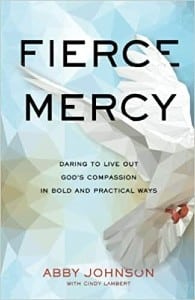
Receive the book Fierce Mercy for your donation of any amount! Plus, receive member-exclusive benefits when you make a recurring gift today. Your monthly support helps families thrive.

Visit our online store and purchase a CD of today's program for yourself or to share with a friend.
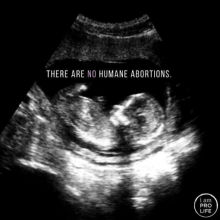
The Perfect Love Series demonstrates the power of applying Christ-like love to alarming pro-choice questions. From doctors and journalists to those who have experienced abortion first-hand, this series captures how professionals respond to aggressive accusations about their pro-life beliefs.

The monetary cost of an abortion can run up to $1,600, with the average cost being around $600. However, abortion "costs" much more.
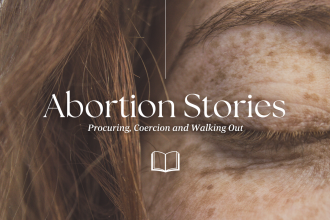
From taking the abortion pill to clinical abortions, from abortion worker to abortion survivor — these are real abortion stories.

Once the director of a Planned Parenthood clinic, Abby Johnson is now a passionate, outspoken advocate for the sanctity of human life.

Does God forgive abortion? To answer this question, we look to the Bible, those who are post-abortive, and abortion survivors.
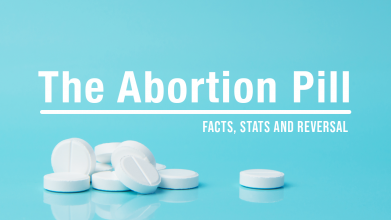
How does the Abortion Pill work? The term "Abortion Pill" refers to two pills containing different medicines: mifepristone and misoprostol.
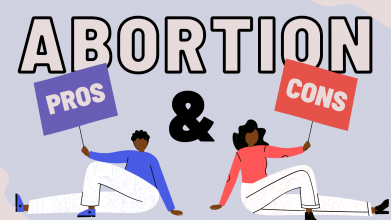
How to share your pro-life values with compassion, truth and love.

In this Adventures in Odyssey drama, a carelessly uttered word from Eugene creates havoc as it becomes the fashionable insult, resulting in a lesson about the power of words.

This discussion offers a preview of Volume #16 “Cultures in Conflict” from the That The World May Know video series, available below.

Debra Fileta will help couples better understand the four seasons of healthy relationships, what to expect during each one, and how to carefully navigate them for a stronger marriage. (Part 1 of 2)

Larnelle Harris shares stories about how God redeemed the dysfunctional past of his parents, the many African-American teachers who sacrificed their time and energy to give young men like himself a better future, and how his faithfulness to godly principles gave him greater opportunities and career success than anything else.

Amy Carroll shares how her perfectionism led to her being discontent in her marriage for over a decade, how she learned to find value in who Christ is, not in what she does, and practical ways everyone can accept the messiness of marriage and of life.

Jonathan McKee offers parents practical advice and encouragement in a discussion based on his book If I Had a Parenting Do Over: 7 Vital Changes I’d Make.